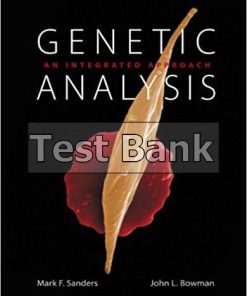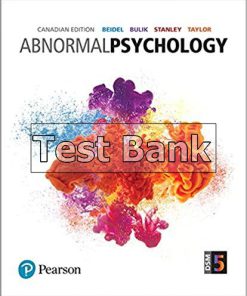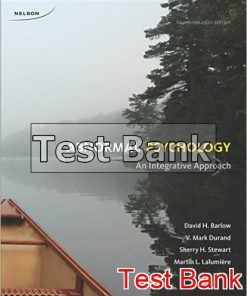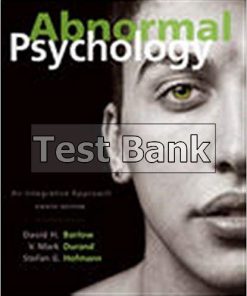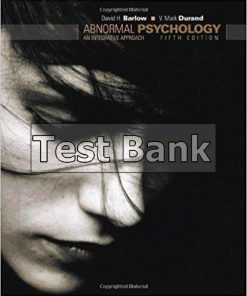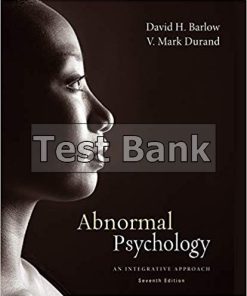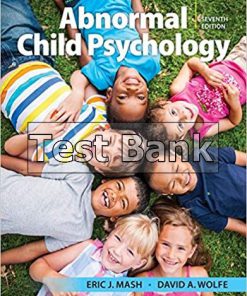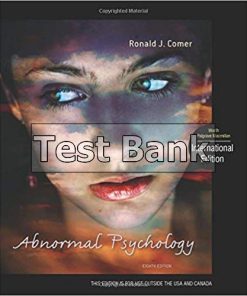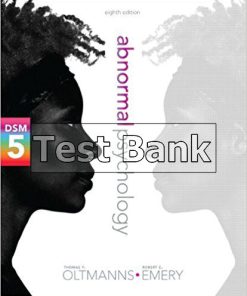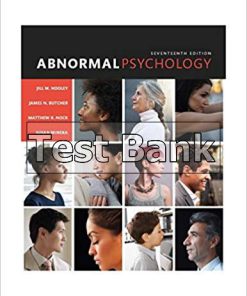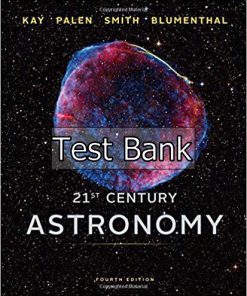$26.50$50.00 (-47%)
In stock
Abnormal Psychology An Integrative Approach canadian 5th Edition Barlow Test Bank.
You may also like
Abnormal Psychology An Integrative Approach canadian 5th Edition Barlow Test Bank
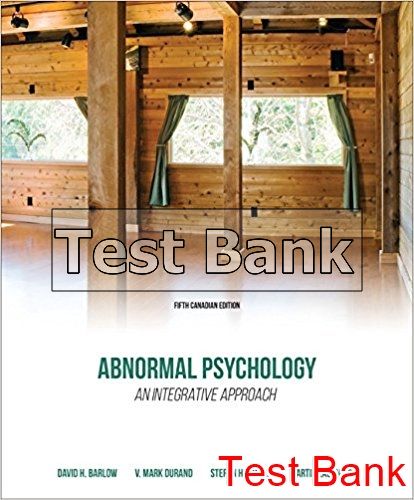
Product details:
- ISBN-10 : 0176657185
- ISBN-13 : 978-0176657185
- Author: David H. Barlow
Balancing biological, psychological, social, and cultural approaches, the Fifth Canadian Edition of Abnormal Psychology’s groundbreaking integrative approach continues its tradition of delivering the most modern, scientifically valid method for studying abnormal psychology. The author team ― now including Dr. Stefan G. Hofmann ― blends sophisticated research and an accessible writing style with the most widely recognized method of discussing psychopathology. Going beyond simply describing different schools of thought on psychological disorders, the authors explore the interactions of the various forces that contribute to psychopathology. With a conversational writing style and consistent pedagogical elements, this comprehensive resource includes integrated case studies (95 percent from the authors’ own files) and additional study tools. Also available: the MindTap® online learning experience, featuring video activities and clips of clients introduced in the book.
Table contents:
- 1 Abnormal Behaviour in Historical Context
- What Is a Psychological Disorder?
- Psychological Dysfunction
- Personal Distress or Impairment
- Atypical or Not Culturally Expected
- The Science of Psychopathology
- The Scientist-Practitioner
- Clinical Description
- Causation, Treatment, and Outcomes
- The Past: Historical Conceptions of Abnormal Behaviour
- The Supernatural Tradition
- Demons and Witches
- Stress and Melancholy
- Treatments for Possession
- The Moon and the Stars
- Comments
- The Biological Tradition
- Hippocrates and Galen
- The 19th Century
- The Development of Biological Treatments
- Consequences of the Biological Tradition
- The Psychological Tradition
- Moral Therapy
- Asylum Reform and the Decline of Moral Therapy
- Psychoanalytic Theory
- Humanistic Theory
- The Behavioural Model
- The Present: The Scientific Method and an Integrative Approach
- Summary
- Key Terms
- Answers to Concept Checks
- Media Resources
- 2 An Integrative Approach to Psychopathology
- One-Dimensional or Multidimensional Models
- What Caused Jody’s Phobia?
- Outcome and Comments
- Genetic Contributions to Psychopathology
- The Nature of Genes
- New Developments in the Study of Genes and Behaviour
- The Interaction of Genetic and Environmental Effects
- Epigenetics and the Nongenomic “Inheritance” of Behaviour
- Neuroscience and Its Contributions to Psychopathology
- The Central Nervous System
- The Structure of the Brain
- The Peripheral Nervous System
- Neurotransmitters
- Implications for Psychopathology
- Psychosocial Influences on Brain Structure and Function
- Interactions of Psychosocial Factors with Brain Structure ?and Function
- Comments
- Behavioural and Cognitive Science
- Conditioning and Cognitive Processes
- Learned Helplessness
- Social Learning
- Prepared Learning
- Cognitive Science and the Unconscious
- Cognitive-Behavioural Therapy
- Emotions
- The Physiology and Purpose of Fear
- Emotional Phenomena
- The Components of Emotion
- Emotions and Psychopathology
- Cultural, Social, and Interpersonal Factors
- Gender Roles
- Social Effects on Health and Behaviour
- Interpersonal Psychotherapy
- Lifespan Development
- The Principle of Equifinality
- Conclusions
- Summary
- Key Terms
- Answers to Concept Checks
- Media Resources
- 3 Clinical Assessment and Diagnosis
- Assessing Psychological Disorders
- The Clinical Interview
- Physical Examination
- Behavioural Assessment
- Psychological Testing
- Neuropsychological Testing
- Neuroimaging: Pictures of the Brain
- Psychophysiological Assessment
- Diagnosing Psychological Disorders
- Classification Issues
- Diagnosis before 1980
- DSM-III and DSM-III-R
- DSM-IV and DSM-IV-TR
- DSM-5
- Creating a Diagnosis
- Beyond DSM-5: Dimensions and Spectra
- Summary
- Key Terms
- Answers to Concept Checks
- Media Resources
- 4 Research Methods
- Important Concepts
- Basic Components of a Research Study
- Statistical versus Clinical Significance
- The Average Client
- Studying Individual Cases
- Research by Correlation
- Epidemiological Research
- Research by Experiment
- Experimental Designs
- Process and Outcome of Treatment
- Single-Case Experimental Designs
- Repeated Measurements
- Withdrawal Designs
- Studying Genetics
- Family Studies
- Adoption Studies
- Twin Studies
- Genetic Linkage Analysis and Association Studies
- Studying Behaviour over Time
- Prevention Research
- Cross-Sectional Designs
- Longitudinal Designs
- Studying Behaviour across Cultures
- The Power of a Program of Research
- Replication
- Research Ethics
- Summary
- Key Terms
- Answers to Concept Checks
- Media Resources
- 5 Anxiety, Trauma-Related, and Obsessive-Compulsive Disorders
- The Complexity of Anxiety Disorders
- Anxiety, Fear, and Panic
- Causes of Anxiety and Related Disorders
- Comorbidity of Anxiety and Related Disorders
- Comorbidity with Physical Disorders
- Suicide
- Anxiety Disorders
- Generalized Anxiety Disorder
- Clinical Description
- Statistics
- Causes
- Treatment
- Panic Disorder and Agoraphobia
- Clinical Description
- Statistics
- Causes
- Treatment
- Specific Phobia
- Clinical Description
- Statistics
- Causes
- Treatment
- Social Anxiety Disorder (Social Phobia)
- Clinical Description
- Statistics
- Causes
- Treatment
- Trauma- and Stressor-Related Disorders
- Post-Traumatic Stress Disorder
- Clinical Description
- Statistics
- Causes
- Treatment
- Obsessive-Compulsive and Related Disorders
- Obsessive-Compulsive Disorder
- Clinical Description
- Statistics
- Causes
- Treatment
- Body Dysmorphic Disorder
- Clinical Description
- Statistics
- Causes and Treatment
- Plastic Surgery and Other Medical Treatments
- Other Obsessive-Compulsive and Related Disorders
- Hoarding Disorder
- Trichotillomania (Hair Pulling Disorder) and Excoriation ?(Skin Picking Disorder)
- Summary
- Key Terms
- Answers to Concept Checks
- Media Resources
- 6 Somatic Symptom and Dissociative Disorders
- Somatic Symptom Disorder and Related Disorders
- Somatic Symptom Disorder
- Illness Anxiety Disorder
- Psychological Factors Affecting Medical Condition
- Conversion Disorder (Functional Neurological Symptom Disorder)
- Dissociative Disorders
- Depersonalization-Derealization Disorder
- Dissociative Amnesia
- Dissociative Identity Disorder
- Summary
- Key Terms
- Answers to Concept Checks
- Media Resources
- 7 Mood Disorders and Suicide
- An Overview of Depression and Mania
- The Structure of Mood Disorders
- Depressive Disorders
- Clinical Descriptions
- Onset and Duration
- From Grief to Depression
- Other Depressive Disorders
- Bipolar Disorders
People also search:
abnormal psychology an integrative approach free pdf
|
abnormal psychology an integrative approach (8th ed.)
abnormal psychology an integrative approach pdf
|

